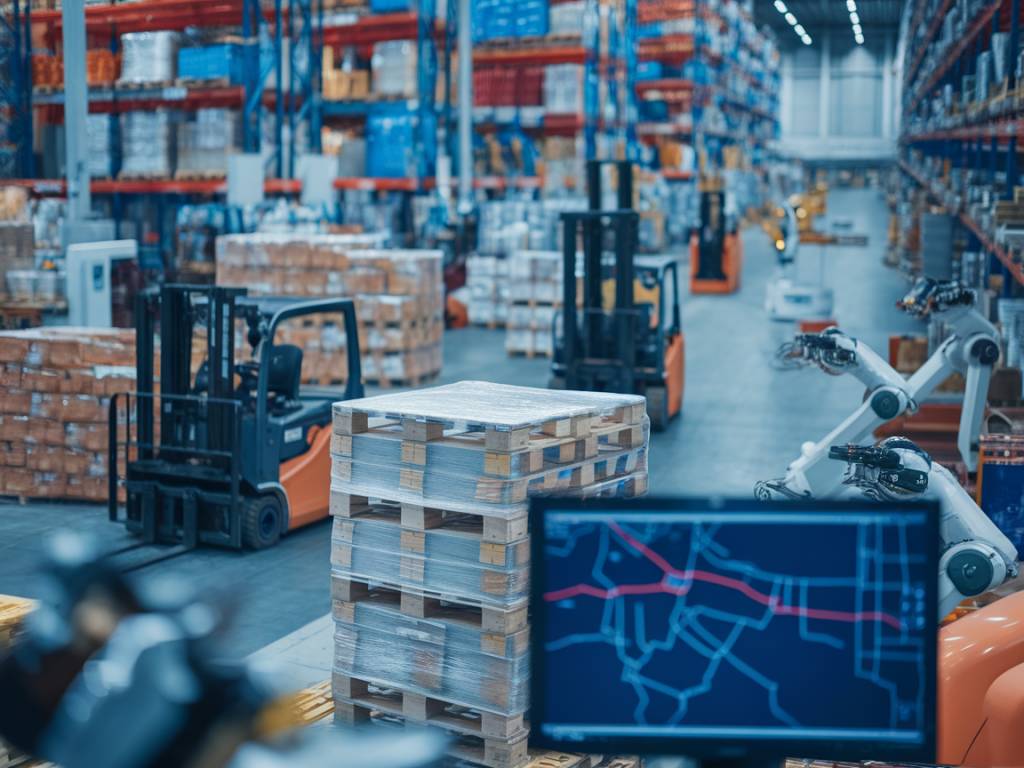Artificial Intelligence (AI) and Machine Learning (ML) are rapidly transforming the logistics industry, offering unprecedented opportunities for optimization, cost reduction, and efficiency enhancement. As we delve into the specific applications and impacts of AI and ML in logistics, it becomes increasingly clear that these technologies represent a pivotal shift in how logistics operations are managed and executed.
Understanding AI and ML in Logistics
AI refers to the capability of machines to perform tasks that typically require human intelligence, such as problem-solving, decision-making, and pattern recognition. Machine Learning, a subset of AI, involves the use of algorithms and statistical models to enable machines to improve their performance on tasks through experience. In the context of logistics, AI and ML are employed to analyze vast amounts of data, predict logistical challenges, and optimize workflows.
Key Applications of AI and ML in Logistics
Predictive Analytics
One of the most impactful applications of AI and ML in logistics is predictive analytics. By leveraging historical data, machine learning algorithms can forecast demand, predict inventory levels, and anticipate delivery times with remarkable accuracy. This capability allows logistics companies to anticipate potential disruptions, optimize inventory levels, and improve overall supply chain efficiency.
Route Optimization
AI-powered route optimization tools are revolutionizing transportation logistics. These tools can analyze real-time traffic data, weather conditions, and historical traffic patterns to identify the most efficient routes for delivery. By minimizing travel time and fuel consumption, route optimization not only reduces costs but also enhances delivery speed and reliability.
Warehouse Automation
Machine learning algorithms are increasingly used to control robots and automated systems in warehouses. These intelligent systems can manage inventory, pick and pack items, and even move goods within the warehouse, significantly reducing the need for manual labor. As a result, warehouses become more efficient, accurate, and capable of handling higher volumes of goods.
Supply Chain Management
AI and ML are enhancing supply chain management by providing real-time visibility and insights into the movement of goods. These technologies can monitor and analyze supply chain activities, detect anomalies, and suggest corrective actions, leading to greater transparency and more proactive management. This real-time oversight helps logistics managers make informed decisions and respond quickly to any issues that arise.
Benefits of Implementing AI and ML in Logistics
Cost Reduction
Implementing AI and ML technologies can result in significant cost savings for logistics companies. By optimizing routes, reducing fuel consumption, and minimizing manual labor through automation, companies can lower operational expenses. Additionally, predictive analytics help in maintaining optimal inventory levels, thereby reducing storage costs and minimizing losses due to overstocking or stockouts.
Enhanced Efficiency
AI and ML streamline various logistical processes, leading to greater efficiency. Automated systems can operate around the clock without fatigue, ensuring a continuous workflow. Improved accuracy in demand forecasting and inventory management reduces the likelihood of errors, further enhancing operational efficiency.
Improved Customer Satisfaction
With faster delivery times, reliable services, and better communication, AI and ML play a vital role in enhancing customer satisfaction. Predictive analytics help in providing accurate delivery estimates, while automated customer service bots can handle inquiries and provide updates in real-time, improving the overall customer experience.
Sustainability
AI-driven optimizations contribute to more sustainable logistics operations. By reducing fuel consumption through optimized routes and minimizing waste through precise inventory management, logistics companies can lower their environmental footprint. Furthermore, autonomous electric vehicles and drones, powered by AI, are being developed to further reduce reliance on fossil fuels.
Challenges and Considerations
Data Quality and Integration
One of the primary challenges in implementing AI and ML in logistics is ensuring high-quality data. The effectiveness of these technologies is heavily dependent on the accuracy and completeness of the data they analyze. Logistics companies must invest in robust data collection and integration systems to support AI and ML initiatives.
High Initial Investment
Adopting AI and ML technologies requires substantial initial investment. This includes costs related to acquiring advanced hardware, developing or purchasing software, and training staff. While the long-term benefits can be significant, the upfront costs can be a barrier for some companies, particularly small and medium-sized enterprises.
Skilled Workforce
The successful implementation of AI and ML in logistics also relies on having a skilled workforce capable of managing and maintaining these systems. Companies must invest in training and development programs to ensure their employees have the necessary skills to leverage AI and ML technologies effectively.
Cybersecurity Risks
With increased reliance on digital technologies, cybersecurity becomes a critical concern. Logistics companies must implement robust cybersecurity measures to protect their AI and ML systems from cyber-attacks, which could potentially disrupt operations and compromise sensitive data.
Future Trends
As AI and ML technologies continue to evolve, their applications in logistics are expected to expand further. Some notable trends include the development of fully autonomous delivery vehicles, advanced robotics for warehouse automation, and more sophisticated predictive analytics capabilities. Additionally, the integration of AI with Internet of Things (IoT) devices is set to provide even greater real-time visibility and control over logistical operations.
The role of AI and machine learning in logistics optimization is both transformative and far-reaching. These technologies offer significant benefits in terms of cost reduction, efficiency enhancement, and customer satisfaction, making them indispensable tools for modern logistics management. Despite some challenges, the future of AI and ML in logistics looks promising, with ongoing advancements set to drive further innovations and improvements in the field.
Summary: This article explores the transformative role of AI and Machine Learning in logistics optimization, highlighting key applications such as predictive analytics, route optimization, warehouse automation, and supply chain management. Despite challenges like high initial investment and data quality issues, AI and ML present significant benefits, enhancing efficiency, reducing costs, and improving customer satisfaction.




